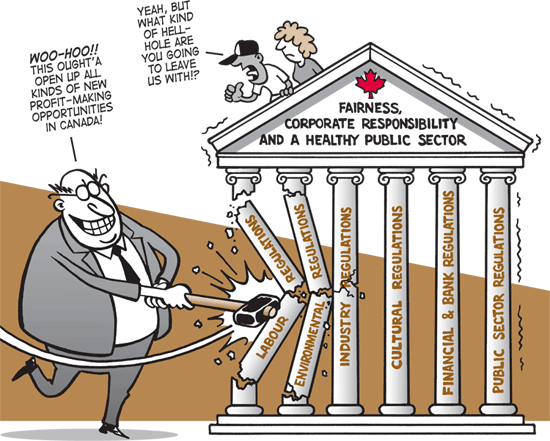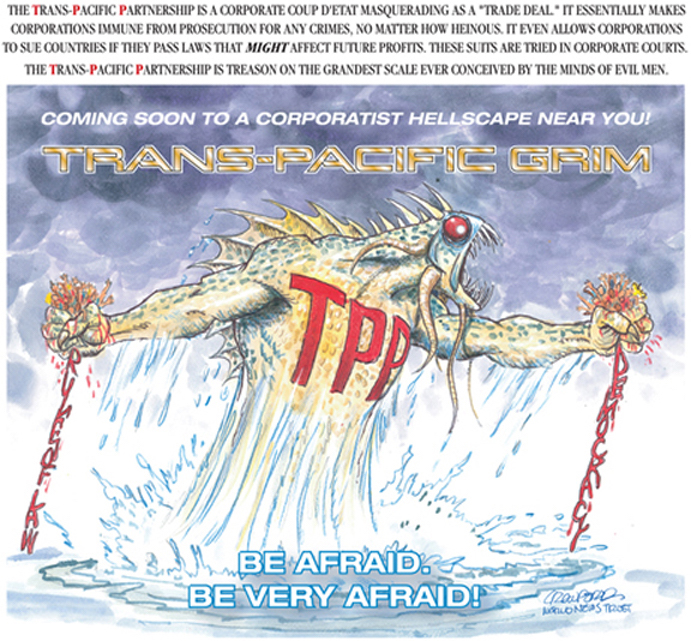New levels of TTIP rejection revealed by Commissionís public consultation
Tuesday, 13 January, 2015

The extent of the Transatlantic Trade and Investment Partnership’s (TTIP) unpopularity across Europe was exposed today as the European Commission published the results of its largest public consultation in history. The results of the consultation, launched last year, were scheduled to be published in late 2014, but were delayed following an unprecedented number of largely negative responses...........
The results of the consultation, which focused on ‘investment protection’ under the controversial trade deal, showed that
of the 149, 399 responses, 97% of participants have voiced either a general rejection of TTIP or opposition to ISDS in TTIP.
the largest number of responses, 52,008 or 34.8% of the total, came from the UK.
Nick Dearden, director of Global Justice Now (formerly World Development Movement) said:
“‘Investment protection’ is an innocuous sounding euphemism for corporations being able to bully governments behind closed doors for billions of pounds of taxpayers’ money, so it’s little wonder that so many people across Europe are opposed to it. This public consultation has demonstrated once more the extent of TTIP’s unpopularity with European citizens."
http://www.globaljustice.org.uk/news/2015/jan/13/new-levels-ttip-rejection-revealed-commission%E2%80%99s-public-consultation
2naSalit
(86,536 posts)in the corporate media propaganda machines.
Thanks for posting!!
This is good to know.
![]()
polly7
(20,582 posts)I knew it wasn't popular in Europe, but had no idea how unpopular it was. They seem to know more about it than we do here in NA.
Faryn Balyncd
(5,125 posts)If this is rammed through, when Americans find out about the details (ISDS), they will be enraged, and it will destroy the Democratic Party.
djean111
(14,255 posts)Are they that arrogant or think us that stupid, to think there will not be blowback?
And no, I sincerely doubt Hillary was just following orders on this.
blkmusclmachine
(16,149 posts)
Response to blkmusclmachine (Reply #6)
blkmusclmachine This message was self-deleted by its author.
Enthusiast
(50,983 posts)What the fuck are they thinking on this and a host of other issues? ![]()
djean111
(14,255 posts)bullshit agreements/legislation du jour. For recognition purposes.
I am afraid the actual answer is, symbolically, Jamie Dimon.
uhnope
(6,419 posts)polly7
(20,582 posts)I don't understand much of it, except that control over pretty much everything we care about protecting here is going to be handed over to corporations, who can sue gov'ts and private citizens alike when they're challenged. I have a lot more learning to do, too.
uhnope
(6,419 posts)polly7
(20,582 posts)involved and set to lose with privatization and loss of control of safeguards for the environment, public safety nets, health services and pharmaceuticals, the ability to save and use seed, and on and on with every one of these agreements. I have a lot of learning to do about it all too, but I know they're all NAFTA on steroids, and all you have to do is look at the devastation in Mexico and the loss of jobs here in NA to understand what more is at stake. Corporations will control all of it, these agreements are spreading that ability like a cancer.
Trans-Pacific Partnership (TPP)
http://en.wikipedia.org/wiki/Trans-Pacific_Partnership

Across Canada and around the world, people are speaking out about the Trans-Pacific Partnership trade agreement (TPP). They are rallying against the secrecy of the 12-country negotiations and the corporate agenda behind the deal.
On February 12, legislators in seven of the 12 TPP countries issued the following joint statement about the negotiations:
We, the undersigned legislators from countries involved in the negotiation of the Trans-Pacific Partnership Agreement, call on the Parties to the negotiation to publish the draft text of the Agreement before any final agreement is signed with sufficient time to enable effective legislative scrutiny and public debate
In Canada, the statement was endorsed by the federal NDP and the Green Party of Canada. It is the simplest of demands for democracy on a “trade” deal that threatens to undermine the very notion of the public good, by giving corporations more power to undermine public policy.
http://www.tppmpsfortransparency.org/
Trans-Pacific Partnership: Canada Should Be Evicted From Trade Talks, Congress Members Say
The Huffington Post Canada | By Daniel Tencer
In a letter sent to the president last week, 140 members of Congress urged the president to cut Canada, as well as Japan, out of talks on the Trans-Pacific Partnership if the countries refuse to open up their agricultural industries to competition under the deal.
The letter said the lawmakers were “troubled by Canada’s lack of ambition, which is threatening a robust outcome for U.S. farmers.”
http://www.huffingtonpost.ca/2014/08/06/tpp-canada-supply-management_n_5654130.html
TTIP
Transatlantic Trade and Investment Partnership
http://en.wikipedia.org/wiki/Transatlantic_Trade_and_Investment_Partnership
Germany rejects CETA and TTIP; Council of Canadians applauds Germany's decision
July 26, 2014
The Council of Canadians applauds Germany's rejection of the Canada-EU and EU-US trade deals reported in Reuters today. The German government decided to reject these trade deals because of provisions that allow companies to sue governments for infringing on their profits.
"This is a victory for democracy. We are pleased that the German government has listened to critics of the investor-state dispute settlement provisions of the deal that give foreign corporations the right to dictate domestic policy," said Maude Barlow, national chairperson of the Council of Canadians.
"We've worked to educate European politicians on just how harmful allowing companies to sue you can be," said Scott Harris, trade campaigner with the Council of Canadians. "We've told them about all the lawsuits Canada has faced under NAFTA for legitimate regulations that protect our health and environment."
The Council of Canadians was a major player in this battle and the first to challenge it. The Council is available for further comment on this breaking story.
http://www.canadians.org/media/germany-rejects-ceta-and-ttip-council-canadians-applauds-germanys-decision
EU-Canada trade deal leak ‘ridicules’ TTIP consultation, campaigners say
Published: 14/08/2014 - 18:03 | Updated: 18/08/2014 - 10:556
 ?itok=pxYRw34t
?itok=pxYRw34t
The leaked text of an EU-Canada free trade deal confirms fears that multinationals may sue EU states in special tribunals for enacting laws that upset their profit forecasts, and now campaigners question the public consultation on a free trade deal with the US.
The leaked EU-Canada Trade Agreement (CETA), signed last November and due to be unveiled on 25 September, contains a controversial chapter on Investor-State Disputes Settlement (ISDS) that is substantially unchanged from previous drafts.
These were used by the EU in March to get stakeholder responses to negotiations for a similar TransAtlantic Trade and Investment Partnership (TTIP) with the US. At the time, the Commission said that it would seriously consider all 150,000 responses.
But the use of the draft’s unamended wording in the final CETA treaty - before the results of the public consultation have even been analysed - show that it was little more than a PR stunt, according to Kenneth Haar, a spokesman for Corporate Europe Observatory.
CETA
Why is CETA bad for Canadians?
1. CETA threatens our public services!
[URL=
 .html][IMG]
.html][IMG] [/IMG][/URL]
[/IMG][/URL]
http://stopceta.ca/bad-deal-for-canada
Comprehensive Economic and Trade Agreement
http://en.wikipedia.org/wiki/Comprehensive_Economic_and_Trade_Agreement
Canada-EU (CETA)
http://www.canadians.org/ceta
Ratification of CETA not likely until late 2015, early 2016
Apr 24, 2014. April 24, 2014 - 8:28am
The Toronto Star reports, "Six months after Prime Minister Stephen Harper travelled to Brussels to announce Canada’s largest-ever free-trade pact with Europe, Canada and the European Union are still negotiating key aspects of the deal, with implementation possibly as much as two years away. ...Canadian officials estimated (in October 2013) that finalizing the deal, fixing all the legal language, translating the agreement and obtaining approval in Europe and Canada would take until the spring of 2015. But negotiators have yet to resolve a handful of thorny trade issues and the EU now doesn’t expect the pact to be put in place until late 2015 or early 2016."
"On the table are proposed rules related to import quotas for beef and pork, provision of services by business, investment rules and guidelines for determining, for instance, whether Canadian-exported cars with a mix of Canadian and United States parts are eligible for tariff reductions under CETA. ...Another factor that is raising questions about how the final approval of CETA will go is the recently initiated talks between the EU and the United States on a Transatlantic Trade and Investment Partnership (TTIP).These negotiations appear to have sparked increased concern in Europe over a controversial feature of current trade negotiations — investor-state dispute settlement (ISDS) mechanisms. These measures allow corporations to go before an independent tribunal and sue governments that allegedly discriminate against foreign companies. CETA contains an ISDS clause and any EU-United States agreement is expected to have one as well. But, reflecting complaints by NGOs that corporations are abusing these measures, the European Commission called a temporary halt in ISDS discussions with Washington to hold a public consultation on the measures."
Both the European Parliament and "all 28 member states of the EU must also ratify the pact".
If ratified, CETA could unfairly restrict how local governments spend money and ban 'buy local' policies, add hundreds of millions of dollars to the price of drugs, create pressure to increase privatization of local water systems, transit and energy, and much more. The secret negotiating process, as well as the overall corporate agenda behind these next generation deals, are an affront to democracy on both sides of the Atlantic.
https://monctonfreepress.ca/post/35999
http://www.dw.de/with-ttip-eu-and-us-promise-a-transatlantic-trade-miracle/a-17935749
Saskia Sassen: I think they are crucial elements, starting with the North American Free Trade Agreement (NAFTA) and the World Trade Organization (WTO) rounds, for creating a global operational space that is an advantage for the multinationals. The truth of the matter is that when you look at the data the gains go to the firms operating globally. The notion of losing or gaining jobs like countries in Europe or the United States might try to look at, is just not an issue for them. So what they want is the capacity to access the particular labor supply or regulatory environment that works to their advantage. For the United States the data is quite clear: The United States has basically lost jobs. That affects workers, but it has nothing to do with big corporations. For them this is not important for their operation.
And a final issue I have with all these new generation treaties is that corporations gain rights. If you stand back and ask yourself who gains rights, it is not the citizens. Citizens in many of our countries have lost rights. Little rights that are sort of encased in technical aspects and most citizens don't even realize it until it happens to them. And with TTIP and TTP they gain even more rights and so a lot of critical analysts are stunned by these two treaties.
FAIR TRADE
uhnope
(6,419 posts)I especially hate the idea that Europe would have to lower their food regulations to match the USA's and accept GMO foods. If that's true (I'm not sure about that yet, and this things is still being written), then I will jump on the bandwagon against this thing.
Some of the lines are not so clear. The idea that a company can sue a government for changing a policy that ends up hurting its business in that country--this might sound bad, but in reality there needs to be some arbitration in these matters.
But I believe even Bill Clinton has admitted that NAFTA ended up being a negative, so it's not like I trust these things out of hand.
polly7
(20,582 posts)practices might be forced on countries makes me ill. I worry very much about our health care system being privatized as well as for everyone else who has a safety net. So many things and people affected, yet it's been tried to be kept hidden for so long. You've got to know the reason for that.
blkmusclmachine
(16,149 posts)Enthusiast
(50,983 posts)As far as I'm concerned if these trade deals are forced on us, serious retaliation by the working class will be entirely justified.
KoKo
(84,711 posts)Tace
(6,800 posts)